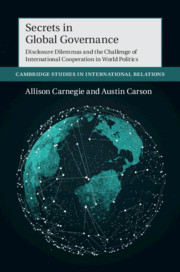Book contents
- Frontmatter
- Contents
- Figures
- Tables
- Acknowledgments
- 1 Introduction
- 2 Theory
- 3 Sensitive Information in Global Governance: The Past and the Present
- 4 Nuclear Proliferation
- 5 International Trade
- 6 War Crimes
- 7 Foreign Direct Investment
- 8 Conclusion
- References
- Index
- Cambridge Studies in International Relations
6 - War Crimes
Published online by Cambridge University Press: 05 June 2020
- Frontmatter
- Contents
- Figures
- Tables
- Acknowledgments
- 1 Introduction
- 2 Theory
- 3 Sensitive Information in Global Governance: The Past and the Present
- 4 Nuclear Proliferation
- 5 International Trade
- 6 War Crimes
- 7 Foreign Direct Investment
- 8 Conclusion
- References
- Index
- Cambridge Studies in International Relations
Summary
The effectiveness of transitional justice is hotly debated. We highlight a largely overlooked source of such war crimes evidence: intelligence provided by third-party states. We argue that such countries often wish to provide this information but withhold it to avoid revealing intelligence sources and methods. The adoption of confidentiality systems by war crimes tribunals can ease this tension. Courts can integrate national intelligence to gain insights into culpability for atrocities while protecting sensitive details. However, supplying states will constrain their disclosures based on their political interests. We analyze US intelligence disclosures to war crimes tribunals for the former Yugoslavia and Rwanda. Drawing on newly reviewed archival materials, elite interviews, and secondary sources, we show that confidentiality protections elicited considerable intelligence disclosures when the United States had a political interest in prosecuting the case, thus increasing arrests and indictments.
- Type
- Chapter
- Information
- Secrets in Global GovernanceDisclosure Dilemmas and the Challenge of International Cooperation, pp. 193 - 239Publisher: Cambridge University PressPrint publication year: 2020



